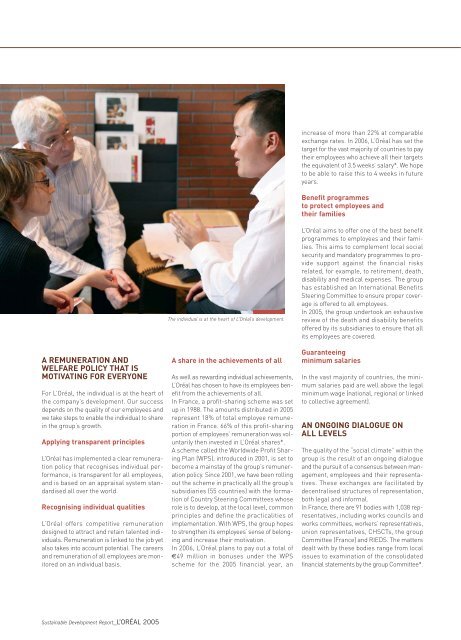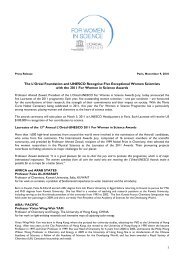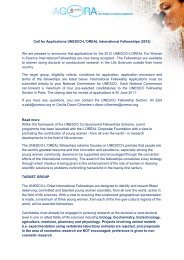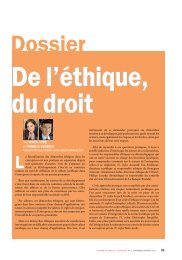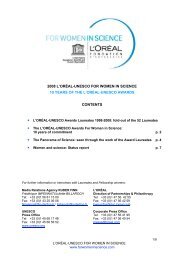2005 SUSTAINABLE DEVELOPMENT REPORT
2005 SUSTAINABLE DEVELOPMENT REPORT
2005 SUSTAINABLE DEVELOPMENT REPORT
Create successful ePaper yourself
Turn your PDF publications into a flip-book with our unique Google optimized e-Paper software.
A REMUNERATION AND<br />
WELFARE POLICY THAT IS<br />
MOTIVATING FOR EVERYONE<br />
For L’Oréal, the individual is at the heart of<br />
the company’s development. Our success<br />
depends on the quality of our employees and<br />
we take steps to enable the individual to share<br />
in the group’s growth.<br />
Applying transparent principles<br />
L’Oréal has implemented a clear remuneration<br />
policy that recognises individual performance,<br />
is transparent for all employees,<br />
and is based on an appraisal system standardised<br />
all over the world.<br />
Recognising individual qualities<br />
L’Oréal offers competitive remuneration<br />
designed to attract and retain talented individuals.<br />
Remuneration is linked to the job yet<br />
also takes into account potential. The careers<br />
and remuneration of all employees are monitored<br />
on an individual basis.<br />
Sustainable Development Report_L’ORÉAL <strong>2005</strong><br />
The individual is at the heart of L’Oréal’s development.<br />
A share in the achievements of all<br />
As well as rewarding individual achievements,<br />
L’Oréal has chosen to have its employees benefit<br />
from the achievements of all.<br />
In France, a profit-sharing scheme was set<br />
up in 1988. The amounts distributed in <strong>2005</strong><br />
represent 18% of total employee remuneration<br />
in France. 66% of this profit-sharing<br />
portion of employees’ remuneration was voluntarily<br />
then invested in L’Oréal shares*.<br />
A scheme called the Worldwide Profit Sharing<br />
Plan (WPS), introduced in 2001, is set to<br />
become a mainstay of the group’s remuneration<br />
policy. Since 2001, we have been rolling<br />
out the scheme in practically all the group’s<br />
subsidiaries (55 countries) with the formation<br />
of Country Steering Committees whose<br />
role is to develop, at the local level, common<br />
principles and define the practicalities of<br />
implementation. With WPS, the group hopes<br />
to strengthen its employees’ sense of belonging<br />
and increase their motivation.<br />
In 2006, L’Oréal plans to pay out a total of<br />
€49 million in bonuses under the WPS<br />
scheme for the <strong>2005</strong> financial year, an<br />
increase of more than 22% at comparable<br />
exchange rates. In 2006, L’Oréal has set the<br />
target for the vast majority of countries to pay<br />
their employees who achieve all their targets<br />
the equivalent of 3.5 weeks’ salary*. We hope<br />
to be able to raise this to 4 weeks in future<br />
years.<br />
Benefit programmes<br />
to protect employees and<br />
their families<br />
L’Oréal aims to offer one of the best benefit<br />
programmes to employees and their families.<br />
This aims to complement local social<br />
security and mandatory programmes to provide<br />
support against the financial risks<br />
related, for example, to retirement, death,<br />
disability and medical expenses. The group<br />
has established an International Benefits<br />
Steering Committee to ensure proper coverage<br />
is offered to all employees.<br />
In <strong>2005</strong>, the group undertook an exhaustive<br />
review of the death and disability benefits<br />
offered by its subsidiaries to ensure that all<br />
its employees are covered.<br />
Guaranteeing<br />
minimum salaries<br />
In the vast majority of countries, the minimum<br />
salaries paid are well above the legal<br />
minimum wage (national, regional or linked<br />
to collective agreement).<br />
AN ONGOING DIALOGUE ON<br />
ALL LEVELS<br />
The quality of the “social climate” within the<br />
group is the result of an ongoing dialogue<br />
and the pursuit of a consensus between management,<br />
employees and their representatives.<br />
These exchanges are facilitated by<br />
decentralised structures of representation,<br />
both legal and informal.<br />
In France, there are 91 bodies with 1,038 representatives,<br />
including works councils and<br />
works committees, workers’ representatives,<br />
union representatives, CHSCTs, the group<br />
Committee (France) and RIEDS. The matters<br />
dealt with by these bodies range from local<br />
issues to examination of the consolidated<br />
financial statements by the group Committee*.


